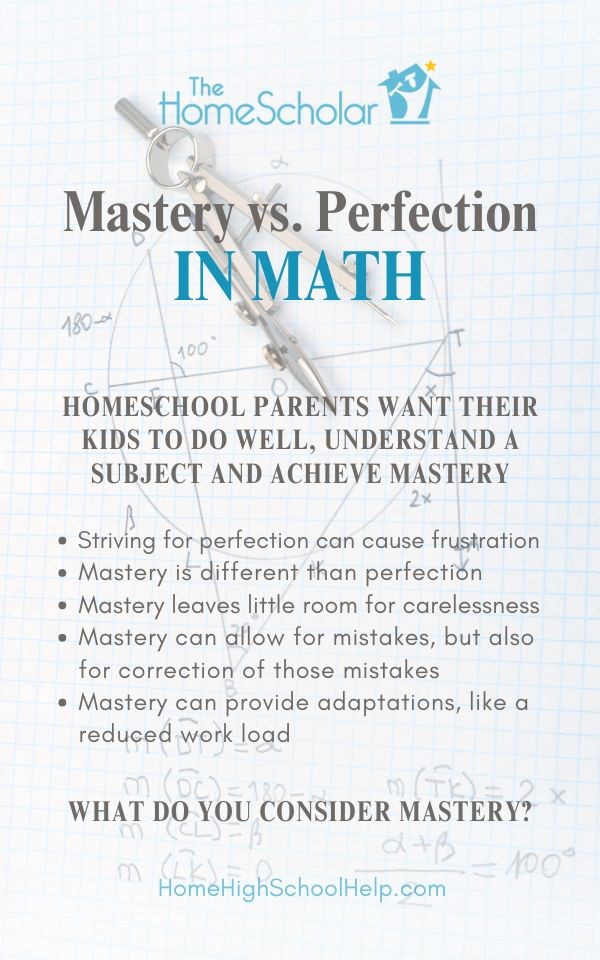Mastery vs. Perfection in Math
I receive many questions from homeschoolers about math. Math is one of those things that everyone worries about at some stage or other. It can feel so big, so overwhelming at times! Many parents have told us that it is oddly comforting to see other parents having the same struggles or questions they do. We received this question a few years ago about mastery vs. perfection when it comes to math.
Dear HomeScholar...
Thank you very much for sharing so much with the rest of us homeschoolers! I have a question regarding carelessness. Using math as an example, my 12 yr. old son is working out of Saxon Algebra 1 currently and is understanding everything very well but gets a few wrong (2-4 on average, occasionally up to 6) due almost always to carelessness. He will work the incorrect ones over again and get them correct and truly understands what he did wrong. However, I have decided to cut him back to working only half a lesson in the hopes that he will take his time and strive for 100 percent and if he does not score a 90 percent or higher, he has to re-do the half-lesson over again until he achieves this. What are your thoughts on this?? He is definitely heading in the direction of engineering, and I know how important it is for him to be careful.
Thank you for your thoughts,
Theresa
Thank you for your thoughts,
Theresa
My Thoughts on the Matter...
Carelessness in any subject, but especially with math, is a complicated subject. Homeschool parents want their kids to do well, understand a subject, and achieve mastery. We want our children to learn about hard work and the benefits of doing a job well. But there is another side to carelessness that we have to consider.
When I set my budget for the month, I don't always get the answer perfectly right. Sometimes I slip up and make little errors that I don't notice until the very end of the task! Then I have to search until I find the arithmetic error, so everything balances again. Yet I do believe I have achieved mastery over addition and subtraction!
Mastery is different than perfection. Your child may demonstrate mastery by scoring 90% on an assignment (or you may consider they have mastery with less than that). They shouldn't be required to be "perfect" though. When I was in high school, I also used Saxon math curriculum and my mom had me correct all the errors in my daily work. When I got it wrong, I corrected it. Like you, my mom was hoping the tediousness of correcting would encourage me to be more careful in my daily work.
Mastery is different than perfection. Your child may demonstrate mastery by scoring 90% on an assignment (or you may consider they have mastery with less than that). They shouldn't be required to be "perfect" though. When I was in high school, I also used Saxon math curriculum and my mom had me correct all the errors in my daily work. When I got it wrong, I corrected it. Like you, my mom was hoping the tediousness of correcting would encourage me to be more careful in my daily work.
I think it did! To me, correcting was far more tedious than doing it right the first time! Just don't jump from requesting being "cautious" to expecting "perfection." Striving for perfection can cause strife and possibly rebellion, because we all know, intuitively, that we simply can't be perfect.
Additional Tips...
Remember that enthusiasm is contagious. If you don't love math, your dread over the task will seep into your child and they will feel dread over the task too. Maybe your child needs a tutor who is passionate about math to reignite their passion for math!
Adjusting the work to fit the child's level of ability might also help cut down on carelessness. In homeschool, a child who is ready to move on to the next concept may move on immediately, and if a child needs to linger, they may linger. Boredom from spending too long on one concept could very well be at the root of many carelessness issues! I also think carelessness could be normal for 12 years old. I shudder when I think back to when I was that age. For me at age 12, carelessness was just that - "I couldn't care less about this." We want better than that for our kids! That's where delight-based learning comes in.
Adjusting the work to fit the child's level of ability might also help cut down on carelessness. In homeschool, a child who is ready to move on to the next concept may move on immediately, and if a child needs to linger, they may linger. Boredom from spending too long on one concept could very well be at the root of many carelessness issues! I also think carelessness could be normal for 12 years old. I shudder when I think back to when I was that age. For me at age 12, carelessness was just that - "I couldn't care less about this." We want better than that for our kids! That's where delight-based learning comes in.
I like the idea of holding your child to a high standard of 90%. I like the idea of assigning half the problems, so they have time to be more careful. I like the idea of re-doing any problems that are missed. Just make sure you steer clear of perfection and strive instead for mastery. Clearly communicate your standard of mastery with your student, be that 90% or otherwise, so they have a clear goal to aim for.
Do you strive for mastery in your homeschool? Are you frustrated by a child who is careless in their work? Please share!

 Login
Login









.jpg)

Comments